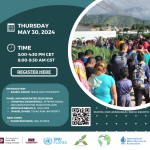Padmi Ranasinghe and Nidhi Nagabhatla are Presenting Paper at International Conference on Sustainable Development 2023

Nidhi Nagabhatla, UNU-CRIS Senior Research Fellow, and Padmi Ranasinghe, UNU-CRIS PhD Fellow, are presenting a paper online on Nature-based solutions for achieving sustainable development goals in the global south; the Sri Lankan Reservoir Cascade System at the International Conference on Sustainable Development 2023 in New York today.
For further information about the programme, please click here.
Abstract
Nature-based solutions (NbS) are vital for achieving several Sustainable Development Goals (SDGs) since they can contribute to reducing food and water scarcity, climate change, disaster impacts, and threats to human health while minimizing degradation of the environment and biodiversity loss. A major advantage of NbS is its cost-effective, sustainable, and multipurpose approach benefiting people and the environment simultaneously. The Reservoir Cascade System in Sri Lanka is an ancient hydrological and engineered system heavily integrated with NbS. The Cascade systems consist of interconnected irrigation tanks within a watershed that collect rainwater and surface water and store it for later use to make water available year-round in the dry zone. It consists of water storage tanks, connecting streams, forests, natural sedimentation/buffer systems, wetlands, agricultural areas, and communities. A cascade system embeds various ecosystems, including forests, wetlands, agricultural lands, terrestrial and aquatic ecosystems, and those ecosystems' conservation, restoration, and management. It also addresses various social and economic concerns, including unemployment, disaster risk, land degradation, etc., while maintaining environmental integrity, respecting local communities' indigenous knowledge rights, and empowering local communities. The cascade system has been known for sustainable water management and climate change adaptation mechanisms in the Dry Zone of Sri Lanka for millennials. The FAO recently recognized the system as a Globally Important Agricultural Heritage System (GIAHS). Due to various issues, tanks and channels in cascade systems result in reduced water retention capacity, increased Sedimentation and siltation, stone channel degradation, and rapid encroachment, hence lost interconnectivity, among other features. Therefore, this study examined specific SDG goals and targets cascade systems can achieve in rural water scarcity areas in Sri Lanka and beyond. The cascading system directly supports achieving SDGs 1,2,6,13, and 15 and associated targets, with the potential to support other SDGs as well. National strategy and policies should be developed, as well as multi-stakeholder participation, public-private partnerships, and a secure financing mechanism for maintenance is needed. The success of this can be a model for other countries and communities in implementing drought resilience, flood resilience, and climate resilience and achieving SDGs.




